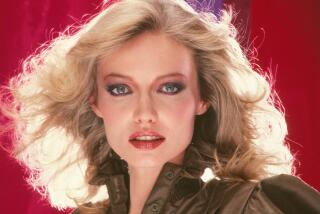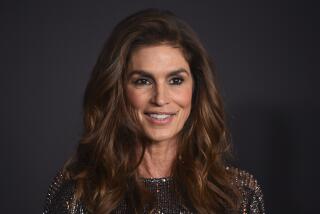Some Girl Talk From 13 Notable Women
When Candice Bergen was a girl she was afraid of the dark. She still is. When “The X-Files’” Gillian Anderson was a girl her ambition was to be a grown-up. Astronaut Sally Ride wanted to play professional baseball with the Los Angeles Dodgers.
They are just three of 13 famous women from various walks of life who tell their unique stories of growing up on the WE: Women’s Entertainment special “When I Was a Girl,” premiering Sunday on the cable network.
With Stockard Channing as host, the hourlong documentary features actresses Bergen, Anderson, Edie Falco, Wendie Malick, Elizabeth Perkins, Michelle Rodriguez and Amy Sedaris, opera star Denyce Graves, astronaut Ride, political pundit Dee Dee Myers, WNBA star Lisa Leslie, Pulitzer Prize-winning author Anna Quindlen and Children’s Defense Fund activist Marian Wright Edelman.
“I wanted to do this show for a while,” said broadcast journalist Linda Ellerbee, who is executive producer of the special. “We all grow up to be different women, but the one thing we have in common is that we were all girls. And we have been girls at different times. Dee Dee Myers’ first memory of the larger world is when her father went to Vietnam, whereas Marian Wright Edelman’s first memory is that somebody snatched her from [a whites-only] water fountain. She said, ‘I didn’t know there was black water and white water.’”
During the interviews, Ellerbee said she discovered that all the women’s experiences growing up “were separate to them, but collectively there were similarities, if such a thing is possible.”
The documentary is broken down into five acts. Act 1 recounts the women’s earliest memories.
“For most of them their very first memory was mother,” Ellerbee said. “We ask them to finish sentences like, ‘When I was a girl I thought my mother was....’”
Replies ranged from Falco describing her mother as the most beautiful woman she had ever seen to Perkins’ memory of listening to her divorced mother crying.
On the other end of the spectrum, Quindlen questions her mother’s decision to put dust ruffles on her bed. Quindlen thought there was a monster lurking under the ruffles, so she would always run and leap on her bed to avoid being attacked by the creature.
In Act 2, the women talk about their lives beyond their backyards. Act 3 chronicles how they coped with adolescence.
“If there is one thing in common, I don’t think there was a single woman who said, ‘I think adolescence is really easy,’” Ellerbee said. Perkins, for example, confesses to being “weird” during that time in her life.
Training bras are a major topic in this section. “Candice says, ‘I didn’t need one then and I don’t need one now, but I still had to have one,’” Ellerbee said. “She went to the drugstore to buy one. Anna Quindlen talks about the fact that you had to have one, because the guys [in your class] would come up behind you and would snap the bra. There had to be something there to snap.”
Act 4 examines high school experiences, and in Act 5 the women are asked what they would tell their younger selves.
The women are interviewed separately. Peppered throughout the documentary are photos and home movies of the participants. “It’s very dream-like,” Ellerbee said.
One especially amusing photograph features a young Bergen and her famous father, ventriloquist Edgar Bergen, holding an elaborate funeral for her pet turtle.
“She had the weirdest pets,” said Ellerbee, laughing. “She had a burro that wouldn’t move. She would go to the top of the hill [near her house] and sit on the burro that wouldn’t move and pretend to protect the house from marauders.”
The participants seemed to welcome the fact that the program didn’t concentrate on how they became famous.
“The reaction from all of the women was, ‘These are the most interesting questions I’ve ever been asked. No one has asked me this before,’” Ellerbee said. “This show [is about] how you became who you are as a human.”
*
“When I Was a Girl” will be shown Sunday night at 5 and 10 on WE: Women’s Entertainment.
More to Read
The complete guide to home viewing
Get Screen Gab for everything about the TV shows and streaming movies everyone’s talking about.
You may occasionally receive promotional content from the Los Angeles Times.







